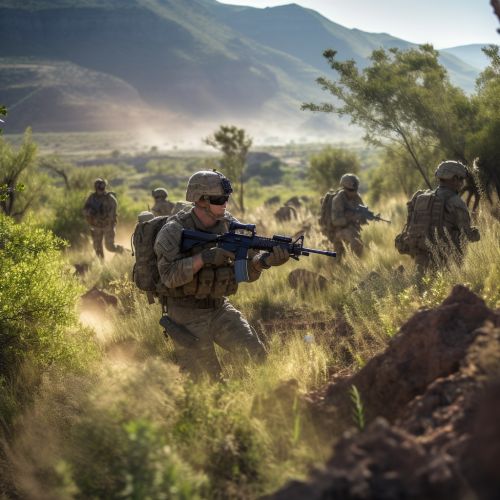Military training
Introduction
Military training refers to the instruction of personnel to enhance their capacity to perform specific military functions and tasks. The term encompasses a broad range of activities, including physical conditioning, tactical drills, weapons handling, and leadership development. Military training is a critical component of a country's defense strategy, ensuring that its armed forces are prepared to respond effectively to various threats and challenges. Military strategies often heavily rely on the quality of training provided to the troops.
History of Military Training
The history of military training dates back to ancient times, with evidence of organized warfare and military drills found in many early civilizations. In ancient Sparta, for instance, military training was an integral part of society, with boys starting their training at a young age. The Roman Empire also placed a strong emphasis on military training, with the Roman legions being renowned for their discipline and tactical prowess.
Types of Military Training
There are several types of military training, each designed to develop specific skills and competencies.
Basic Training
Basic training, also known as boot camp, is the initial instruction that every military recruit must undergo. It focuses on physical fitness, discipline, and basic military knowledge. Recruits learn about the military's values and standards, and they are taught basic combat skills, including weapons handling and first aid.
Advanced Individual Training
After basic training, soldiers typically proceed to Advanced Individual Training (AIT), where they receive instruction in their specific Military Occupational Specialties (MOS). This can range from infantry tactics to medical procedures, depending on the soldier's chosen field.
Officer Training
Officer training is designed to prepare commissioned officers to lead troops and make strategic decisions. This training often includes advanced leadership courses, strategy development, and in-depth studies of military history and doctrine.
Specialized Training
Specialized training programs are designed to develop specific skills or qualifications, such as airborne training, sniper training, or Special Forces selection. These programs are typically physically and mentally demanding, and they require a high level of commitment and dedication from the participants.
Methods of Military Training
Military training methods have evolved over time, with modern militaries utilizing a combination of traditional and innovative approaches.
Drill and Ceremony
Drill and ceremony is a traditional method of military training that focuses on discipline, teamwork, and precision. It involves the practice of marching and handling weapons in a synchronized manner. This method is often used in basic training to instill discipline and cohesion among recruits.
Field Training Exercises
Field training exercises (FTXs) are practical training events that simulate real-world military operations. They provide soldiers with an opportunity to apply the skills and knowledge they have learned in a realistic and challenging environment.
Simulation and Virtual Reality
With advancements in technology, simulation and virtual reality (VR) have become increasingly important in military training. These tools allow for realistic, safe, and cost-effective training scenarios, enabling soldiers to practice complex tasks and experience simulated combat situations without the risk of injury or loss of life.
Importance of Military Training
Military training is crucial for several reasons. It prepares soldiers for the physical and mental challenges of military service, equips them with the skills and knowledge necessary to perform their duties effectively, and fosters teamwork and camaraderie among troops. Moreover, well-trained soldiers are essential for a country's defense capabilities, contributing to its ability to deter threats and protect its national interests.
Challenges in Military Training
Despite its importance, military training also presents several challenges. These include the need to balance physical rigor with safety, the difficulty of simulating realistic combat scenarios, and the challenge of keeping pace with technological advancements in warfare. Additionally, military training must also address ethical considerations, ensuring that soldiers are prepared to make difficult decisions in accordance with the laws of war and military ethics.
Conclusion
Military training is a complex and multifaceted process, involving a wide range of activities designed to prepare soldiers for the demands of military service. It plays a crucial role in a country's defense strategy, contributing to the effectiveness and readiness of its armed forces. Despite the challenges it presents, military training remains a vital component of military operations, underscoring the importance of continued innovation and improvement in training methods and technologies.
See Also
- Military Education and Training
- Physical Training in the Military
- Military Simulation
- Military Doctrine


